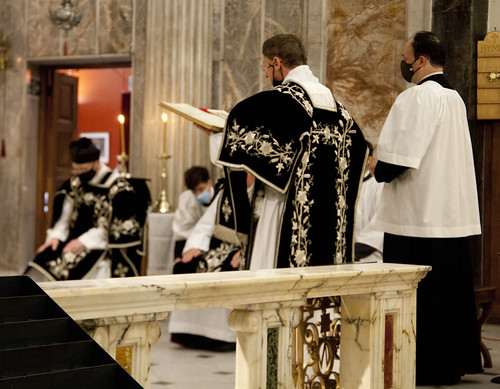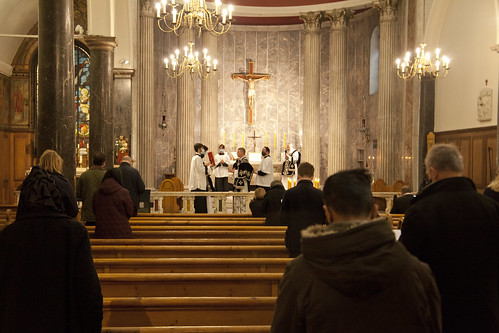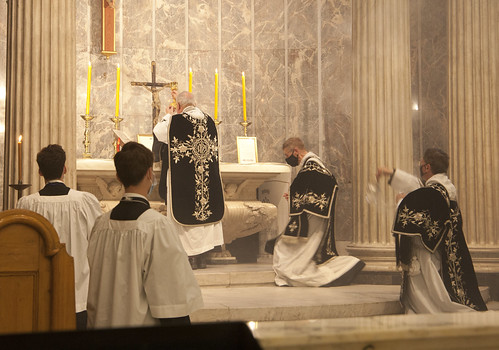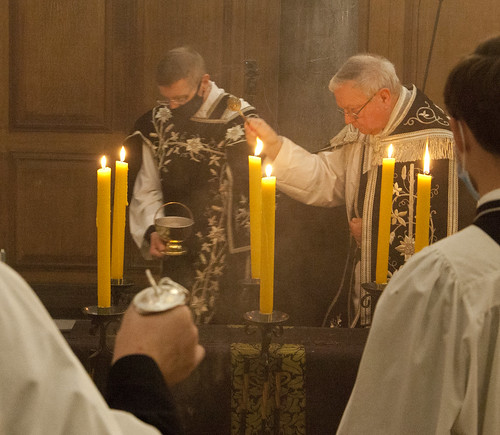Chairman's Blog
Spring Mass of Ages is here!
The new issue should be on members' doormats and in churches this weekend.
I have myself a feature article of the late Fr Reggie Foster and his teaching system and book, Ossa Latinitatis Sola: verdict, not all that great.
In this issue: • John Henry Newman Appeal: Help save the Cardinal Saint’s unique collection of books as well as the room where he worked, studied, and latterly said Mass • Sisters of the Cross: Alan Frost looks at the remarkable life of the Venerable Elizabeth Prout CP • Fr Reggie Foster and his book: Joseph Shaw bids farewell to the King of Catholic Latin • Our Lady of Glastonbury: Dom Bede Rowe on a living Benedictine tradition in the West Country • The scholar priest: Charles A. Coulombe remembers linguist and adventurer Adrian Fortescue • Communist infiltration? Kevin J. Symonds looks at the curious history of Dr Bella Dodd and the Catholic Church.
Requiem for HM Prince Philip, Duke of Edinburgh
Sponsorship for Embroidery Course at the Royal School of Needlework
In 2019 the Guild of St Clare made the first award under its Sponsorship Scheme to help a student through the Certificate Course at the Royal School of Needlework (RSN), and in 2020 we made the second. Our two sponsored students are, despite the epidemic, progressing through the course, and we are now inviting new candidates to apply for the scheme.
The deadline for applications this year is 22nd June.
The RSN Certificate Course takes between one and four years, depending on how intensively students wish to do it. Its great flexibility makes it ideal for those who can only spare limited time, or whose availability fluctuates over the year. The Certificate gives its graduates a thorough grounding in a range of traditional hand-embroidery skills, skills for which the RSN is renowned, and which its experts apply to historic restoration projects and important commissions.
Walking Pilgrimage in Northern Spain, 24-26th July
Although the Chartes Pilgrimage will not be taking place as normal in 2021, a victim in part of its taking place relatively early in the year as we emerge from epidemic restrictions, I'm delighted to bring to a wider public information about a traditional walking pilgrimage in northern Spain, 24th to 26th July, 2021, which everyone should be able to join.
I should also mention that the the Latin Mass Society's annual walking pilgrimage to Walsingham is also open for booking. The dates for this are 26th to 30th August. See here for information and registration.
Nothing will make you feel like a human being and a Catholic again quite like participation in a three-day walking pilgrimage!
Here is more information about the Spanish pilgrimage, which has the support of Una Voce Seville.
Our Lady of Christendom – Spain (NSC-E) is an annual pilgrimage to the shrine of Our Lady of Covadonga (Asturias) organized by a group of faithful lay Catholics devoted to the celebration of the Holy Mass according to the Extraordinary Form of the Roman Rite. It takes place around the feast of St. James the Apostle (July 25th), patron saint of Spain.
The aim of the pilgrimage is the sanctification of the soul through the graces asked to Our Lord, through the intercession of the Blessed Virgin Mary, by the offering of prayers, sacrifices and mortifications during three days. During these days of pilgrimage we especially commend our Homeland and the Holy Father.
NSC-E seeks to contribute to the restoration of the spirit of Christendom – according to our possibilities and always with divine help – which has given the Church and the world so many saints, heroes and defenders of the Faith. We are talking about Christian social order, which is only possible if we commit ourselves to the restoration of everything in Christ, beginning with those of us who are on pilgrimage, our families, and the various spheres of society in which we find ourselves.
Cupich vs. Aquila
My latest on Life Site News.
Following an article in Americaby Archbishop Aquila of Denver, in which he reiterated the Church’s teaching on the importance of approaching Holy Communion with the right dispositions, a bishop—it seems it was Cardinal Cupich—wrote a curious admonition to Aquila, which Aquila quoted in responding to it in a second article:
“I respectfully note that to claim that we can do anything to diminish the Eucharist, or its effects, is contrary to the church’s longstanding teaching. Catholic sacramental theology is based on the premise that the sacraments are the work of Christ, which is the meaning of the Church’s affirmation at Trent (DS 1608) that the sacraments act ex opere operato, or, as St. Thomas wrote in the Summa, III, 68,8: ‘The sacrament is not wrought by the righteousness of either the celebrant or the recipient, but by the power of God.’ Owing to the nature of God, Christ and his works can never be diminished by any act on our part.”
Here, Cupich points out that an unworthy recipient of Holy Communion genuinely receives the Body of Christ, and erroneously infers that he also receives the grace which should accompany that. But God does not force His grace on us. As the ancient chant composed by St Thomas Aquinas for the feast of Corpus Christi expressed it: “Sumunt boni, sumunt mali, sorte tamen inaequáli, vitae vel intéritus”: “The good take, the bad take, yet with unequal destiny, of life, or of ruin”.
Fraser Nelson attacks Home Education
My latest on Life Site News.
The year-long lockdown had a disastrous effect on the education of many of those children who were relying on conventional schools, which did not always rise to the challenge of teaching remotely. Many parents, again, found it difficult, at short notice, to create an environment in which their children could learn effectively, whether through lack of technology, physical space, or for other reasons. These children were still enrolled in schools, and it was the school system which failed them. Children being home-educated, by contrast, found their education disrupted the least of anyone’s.
What happened in 2020 illustrates the robustness of home education. Being tailored to the needs and circumstances of the family and the child, it can deal with the disruption caused by things like illnesses or the family moving house far more easily than a bricks-and-mortar institution. Similarly, providing tuition for a child who wants to study a relatively obscure subject may not be easy for a home-educating family, but in most schools is would be out of the question. All things considered, it’s not going to be home-educated children who are still suffering educationally two or more years from now.
The natural reaction to this situation for some is to attack the very concept of home-education. The latest is Fraser Nelson. He lets the cat out of the bag when he says that it became worth worrying about only now that it has grown, partly thanks to the epidemic. It is not the failure of home education, in other words, that Nelson is worried about, but its success.
Read the whole thing.
Support the Latin Mass Society
Socratic seminars continue
 |
| Socrates is in green up on the left, in profile. |
In early January I offered to lead some online seminars on early Socratic dialogues, as a small personal response to the lockdown, and (almost to my surprise) this has actually happened.
Series 2: Apology (on Socrates' mission), Crito (on political obligation), Charmides (on temperance), and Hippias Minor (on voluntary wrongdoing).
For those who've done either or both of Series 1 and 2:
Series 4: Protagoras (virtue and its teachability) and Gorgias (oratory and justice), each divided into two parts.
Cancel culture and abusive institutions
A few days ago a star choreographer for Britain’s Royal Ballet died at the age of 35. Liam Scarlett’s career had been taking off, with widely praised ballet productions under his belt and more in the pipeline from all over the world. He was the product of an intensely specialized education, having trained as a ballet dancer from the age of eight, successfully making the transition from performance to choreography.
Then he was accused of sexual harassment, within the Royal Ballet. An independent investigation took place, which concluded that there “were no matters to pursue in relation to alleged contact with students of The Royal Ballet School”.
This was not good enough, however. The Royal Ballet, followed by the other institutions which had commissioned work from him, cut all ties with him and informed him that his work would never be seen again. With his professional life in this tiny, specialized world essentially over, Scarlett killed himself.
I have no special information about Scarlett or this case. Perhaps there were some special features of the case I don’t know about which vindicate the Royal Ballet’s actions. It is part of a pattern of “cancel culture,” however, which cannot be explained away. This is a culture in which individuals accused of wrongdoing are destroyed, in terms of reputation and career, even if the normal mechanisms of oversight and investigation conclude that they are not guilty.
Proposed home-schooling 'academy' in Warrington
Reflections on the CDF statement on blessings of homosexual unions
Last October a film was released which included a clip of Pope Francis saying, of homosexual persons, “they are children of God and have a right to a family. Nobody should be thrown out or made miserable over it. What we have to create is a civil union law. That way they are legally covered.”
BBC Radio 4 asked me to say something about the story when it broke. It turned out that I was to be a “conservative” Catholic voice, to be followed immediately by a “liberal” one, to whit the former Editor of the liberal British Catholic weekly, The Tablet, Catherine Pepinster. The BBC journalists were very excited about the Pope’s statement, and thought it presaged a substantive change of Catholic teaching. I happened to be in Rome at that moment, and from my hotel room I tried to calm them down. The big concession the Pope was making, I said, was the very fact that he had said what he had said. He was not about to change the teaching of the Church about sex outside (heterosexual) marriage. His words were designed, not to ready conservative Catholics for such a change, but to console those who are not reconciled to the teaching.
No doubt to the disappointment of the BBC journalists, Catherine Pepinster agreed with me.
We have been vindicated, now, by a statement from the Congregation for the Doctrine of the Faith, setting out the position that the Church does not have the power to bless same-sex unions. The document emphasises that Pope Francis “gave his assent to the publication of the above-mentioned Responsum ad dubium”. It seems that he is in favour of homosexual couples having the legal protections offered by the status of Civil Partnership, but insofar as their relationship (as the CDF says) “involve[s] sexual activity outside of marriage (i.e., outside the indissoluble union of a man and a woman open in itself to the transmission of life)”, then it cannot receive the blessing of the Church. When relationships are blessed, “it is necessary that what is blessed be objectively and positively ordered to receive and express grace, according to the designs of God inscribed in creation, and fully revealed by Christ the Lord.”
Since then Pope Francis has made some qualifying, informal remarks: or possibly not. And the whole media circus goes round again, with rival interpretations and the rest. In the mean time, we’ve just had the bizarre banning of the celebration of (almost all) private Masses in the Vatican basilica. A coincidence, no doubt, but nothing emanating from the Holy See seems to lack a counter-weight, something for the other side of the debate to cheer. Everything is balanced and qualified, obscured by clarifications, and then replaced in the spotlight by the next media-circus act.
This is not just Pope Francis; it is a longer-term feature of the Vatican’s relationship with the media. (Remember Pope Benedict and the condoms?) In order not to go crazy watching the Barque of St Peter apparently tacking wildly in one direction and then another, it is useful to hang on to the distinction Catherine Pepinster and I ended up agreeing one. AsShakespeare’s Henry VIII, about to trash the wretched Cardinal Wolsey, remarks, “words are no deeds.”
As with the issues raised with Amoris Laetitia, one might think that what Pope Francis says is in tension with the teaching, or even flatly incompatible with it, but as with so much over the last fifty years, these words are no deeds. They are intended to change the way people understand the doctrine, or even to distract attention from it, but not to change it. Some of the “pastoral guidelines” on couples living in illicit unions appear to create a situation in which the teaching is relegated to an abstract plane with no connection with reality: but they don’t come out and say the teaching is wrong.
I'm not saying these words are without significance. On the contrary, the resulting pattern of words and actions almost suggests that the teaching of the Church on these fundamental issues is a kind of immovable rock inconveniently in the way of dealing effectively with various delicate pastoral situations, which must therefore somehow be circumvented. It is as if one should say: if onlydivorce and remarriage were possible; if only gay marriage were possible. They aren’t, so let’s give everyone Holy Communion, and ignore the problem. In this way Pope Francis rejects calls to change the teaching, and equally rejects calls to treat the teaching as the life-giving basis of pastoral policy: something to be positively proclaimed and lived by.
The logical conclusion of all this is a picture of the Church labouring under the arbitrary demands of an irrational God, who has to be mollified by keeping certain obscure formulas in the Catechism, but in every other way can be worked around or ignored. This picture, of course, is as contrary to the theological vision of theological conservatives as it is to theological liberals.
Pope Francis' middle way may not be enough to prevent the German Bishops going into schism, and it has not been enough to stop many orthodox pastors and academics (myself included) from protesting, and from criticising Pope Francis, as is set out conveniently in a new book, Defending the Faith, edited by John Lamont. Perhaps Pope Francis will go down in history as the Pope who attempted an impossible balancing-act. It is to be hoped, at least, that his successors learn from this papacy.










